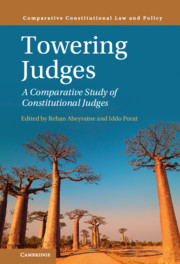Book contents
- Towering Judges
- Comparative Constitutional Law and Policy
- Towering Judges
- Copyright page
- Dedication
- Contents
- Acknowledgements
- Contributors
- Introduction: Towering Judges – A Conceptual and Comparative Analysis
- 1 Towering Judges and Global Constitutionalism
- 2 The Landscapes that Towering Judges Tower Over
- 3 Sir Anthony Mason: Towering Over the High Court of Australia
- 4 Lady Hale: A Feminist Towering Judge
- 5 Hugh Kennedy: Ireland’s (Quietly) Towering Nation-Maker
- 6 Judicial Rhetoric of a Liberal Polity: Hong Kong, 1997–2012
- 7 Judicial Minimalism as Towering: Singapore’s Chief Justice Chan Sek Keong
- 8 Nepal’s Most Towering Judge: The Honourable Kalyan Shrestha
- 9 Barak’s Legal Revolutions and What Remains of Them: Authoritarian Abuse of the Judiciary-Empowerment Revolution in Israel
- 10 PN Bhagwati and the Transformation of India’s Judiciary
- 11 Justice Cepeda’s Institution-Building on the Colombian Constitutional Court: A Fusion of the Political and the Legal
- 12 A Towering but Modest Judicial Figure: The Case of Arthur Chaskalson
- 13 Chief Justice Sólyom and the Paradox of “Revolution under the Rule of Law”
- 14 The Socialist Model of Individual Judicial Powers
- 15 The Civil Law Tradition, the Pinochet Constitution, and Judge Eugenio Valenzuela
- 16 Towering versus Collegial Judges: A Comparative Reflection
- Appendix
- Index
9 - Barak’s Legal Revolutions and What Remains of Them: Authoritarian Abuse of the Judiciary-Empowerment Revolution in Israel
Published online by Cambridge University Press: 25 March 2021
- Towering Judges
- Comparative Constitutional Law and Policy
- Towering Judges
- Copyright page
- Dedication
- Contents
- Acknowledgements
- Contributors
- Introduction: Towering Judges – A Conceptual and Comparative Analysis
- 1 Towering Judges and Global Constitutionalism
- 2 The Landscapes that Towering Judges Tower Over
- 3 Sir Anthony Mason: Towering Over the High Court of Australia
- 4 Lady Hale: A Feminist Towering Judge
- 5 Hugh Kennedy: Ireland’s (Quietly) Towering Nation-Maker
- 6 Judicial Rhetoric of a Liberal Polity: Hong Kong, 1997–2012
- 7 Judicial Minimalism as Towering: Singapore’s Chief Justice Chan Sek Keong
- 8 Nepal’s Most Towering Judge: The Honourable Kalyan Shrestha
- 9 Barak’s Legal Revolutions and What Remains of Them: Authoritarian Abuse of the Judiciary-Empowerment Revolution in Israel
- 10 PN Bhagwati and the Transformation of India’s Judiciary
- 11 Justice Cepeda’s Institution-Building on the Colombian Constitutional Court: A Fusion of the Political and the Legal
- 12 A Towering but Modest Judicial Figure: The Case of Arthur Chaskalson
- 13 Chief Justice Sólyom and the Paradox of “Revolution under the Rule of Law”
- 14 The Socialist Model of Individual Judicial Powers
- 15 The Civil Law Tradition, the Pinochet Constitution, and Judge Eugenio Valenzuela
- 16 Towering versus Collegial Judges: A Comparative Reflection
- Appendix
- Index
Summary
President Aharon Barak has radically transformed the Israeli legal system. He is considered to be an activist judge who rejects literalist interpretation and, instead, interprets the law in light of its purposes. Yet, in recent years, theorists argue that the legal revolution is being eroded and, most likely, is being overturned by a new generation of politicians and newly appointed judges.This chapter raises doubts about this claim. More specifically, it argues that there were two legal revolutions in Israel: 1) the judiciary-empowerment revolution designed to increase judicial power to facilitate judicial intervention in various legal spheres; and 2) the liberal revolution, which injected liberal values into judicial decision-making. The Court uses its increasing power to promote liberal-individualistic values such as dignity, autonomy and equality. I argue that while much criticism is directed at the judiciary-empowerment revolution, the real target of conservative judges is the liberal revolution. Conservative groups in Israel are using the judiciary-empowerment revolution to undo the liberal revolution and transform Israel into an illiberal democracy.
- Type
- Chapter
- Information
- Towering JudgesA Comparative Study of Constitutional Judges, pp. 174 - 194Publisher: Cambridge University PressPrint publication year: 2021
- 1
- Cited by



